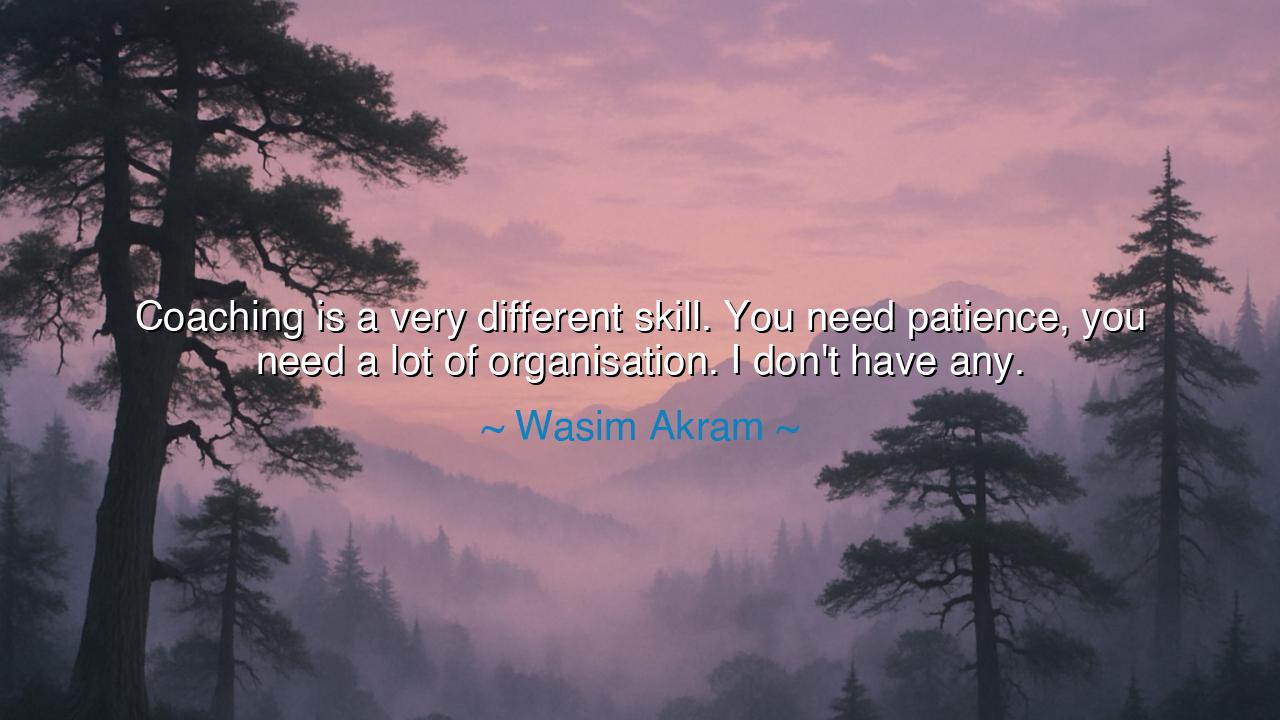
Coaching is a very different skill. You need patience, you need
Coaching is a very different skill. You need patience, you need a lot of organisation. I don't have any.






Hear the words of Wasim Akram, the Sultan of Swing, who once declared with striking honesty: “Coaching is a very different skill. You need patience, you need a lot of organisation. I don’t have any.” In these words lies not only humility, but also the recognition that greatness on the field does not automatically translate into greatness off it. For the warrior who once conquered with instinct and talent must, as a coach, learn to shape others—not by performance, but by guidance. And this, Akram admits, is a craft apart, requiring virtues he himself did not claim to hold.
When Akram speaks of coaching, he acknowledges that it is not merely the teaching of technique, but the nurturing of souls. A coach must see not only the swing of the ball or the stance of the bat, but the spirit of the player: their fears, their doubts, their impatience. To guide them requires patience, the ability to endure repeated mistakes without anger, and to inspire persistence in those who falter. A coach must also command organisation, weaving together the strengths of many into the harmony of a team. This is not the task of a single performer, but of one who builds an orchestra from many instruments.
History bears witness to this difference between the player and the guide. Consider the great Sir Alex Ferguson, who as a footballer was respected, but as a coach became a legend. His power lay not in personal play, but in vision, in the organisation of men, and in the patience to shape young talents into giants. On the other hand, many heroes of the field—great batsmen, bowlers, and captains—have struggled when they turned to coaching, for the instinct that once carried them could not easily be taught to others. The flame that burns within a champion is not always the flame that ignites others.
Akram’s humility here is instructive. He does not disguise his lack of patience, nor claim to be what he is not. In this, he shows greater wisdom than those who chase every title and role. For not all are meant to be coaches, just as not all are meant to be captains, leaders, or kings. To know oneself truly—to know one’s limits as well as one’s strengths—is the mark of true self-mastery. And this honesty is itself a lesson more powerful than pretended perfection.
Yet let us not think that Akram diminishes the craft of the coach. On the contrary, by confessing that he lacks these qualities, he raises coaching as a noble and demanding art. He reminds us that behind every team, behind every champion, stands not only talent but the guiding hand of one who was patient enough to teach, organised enough to plan, and humble enough to serve. The spotlight may fall upon the player, but the unseen labor of the coach is the soil in which greatness grows.
The lesson for us is clear: do not mistake mastery in one domain for mastery in all. The sword-wielder may not make the best general; the poet may not make the best teacher; the champion may not make the best coach. Each role requires its own skills, its own virtues. To live wisely is to discern which paths match your gifts, and which demand strengths you may not hold. There is no shame in this recognition—only clarity.
Practically, this means seeking self-knowledge. Know what you are suited for, and honor those who labor where you cannot. If you are a doer, do; if you are a guide, guide; if you are an organiser, organise. And if you are not, then support those who are. In this way, society flourishes, not by forcing every man into every role, but by allowing each to shine where he is strongest.
Thus the words of Wasim Akram endure as both confession and counsel: “Coaching is a very different skill.” Let us learn from his humility. Let us honor those who teach with patience and organisation, even if we ourselves cannot. And let us remember that true greatness lies not in pretending to be all things, but in knowing who we are, and serving the world with the gifts that are truly ours.






AAdministratorAdministrator
Welcome, honored guests. Please leave a comment, we will respond soon